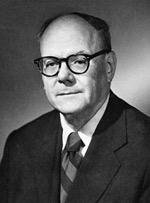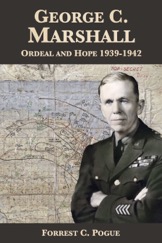
Pogue was first assigned to write a history of the Supreme Headquarters Allied Expeditionary Force from 1945 to 1946. In July he was assigned by Dwight D. Eisenhower to write an official history of the Supreme Command in Europe, for which he interviewed Dwight D. Eisenhower, Omar Bradley, Charles de Gaulle, Alan Brooke and others. Pogue then spent seven years as a military historian, and two years conducting operations research at United States Army Garrison Heidelberg with the Operations Research Office at Johns Hopkins University. He contributed to The Meaning of Yalta among several other books, returning to Murray State in 1954.
In 1956, Pogue was hired by the George C. Marshall Foundation to write the official biography of George C. Marshall in four volumes on which he worked from 1963 to 1987. He became director of the Marshall Foundation in 1956, leaving in 1974 to become director of the Eisenhower Institute for Historical Research. Pogue retired in 1984. He served as a guest lecturer at George Washington University and the United States Army War College, held the Mary Moody Northen chair in Arts and Sciences at Virginia Military Institute in 1972. Pogue was on the Advisory boards for the Office of Naval History, the Naval Historical Office, the United States Army Center of Military History, the Air Force Historical Research Agency, president of the Oral History Association and the American Military Institute and other organizations. The Pogue Library at Murray State is named after him.
Click on each cover for details about each eBook:







